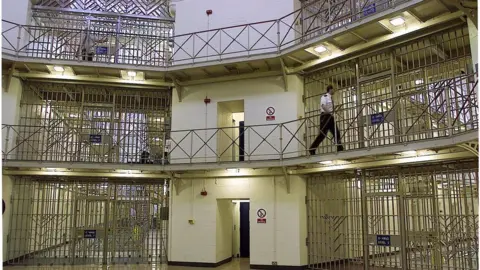'Release ill and elderly prisoners' to reduce jail numbers
 BBC
BBCElderly and seriously ill prisoners should be freed to reduce pressure on jails, according to a think tank.
Freeing those who pose "no more than minimal risk to the life or limb of the public" could save £246m a year, the Centre for Social Justice (CSJ) says.
It says introducing the policy could allow up to 7,000 rehabilitated prisoners to be released early.
The report also calls for an increase in prison officer numbers and improvements in pay and training.
It was written by retired judge John Samuels QC and former cabinet minister turned prison reform campaigner Jonathan Aitken, who was jailed for perjury in 1999.
Titled the "Rehabilitation Revolution", it says "a widespread erosion of morale across all areas of the criminal justice system" is a major cause of the "depressing" failure to rehabilitate prisoners.
 PA
PAThe CSJ wants "problem solving courts" to be set up to encourage non-custodial sentences and for a small number of judges to have the ability to order an inmate's immediate release if certain conditions are met.
The judges would also review original custodial sentences to check whether the punishments should be modified.
Among the prisoners the report says could be considered for early release are:
- Around 500 prisoners serving Imprisonment for Public Protection (IPP) sentences who have been locked up beyond their minimum term and for longer than the maximum fixed period allowed for the original offence.
- Prisoners who have been identified as suffering from incurable and progressive disease.
- Inmates whose age and general incapacity mean they are no longer suitable for confinement within a closed establishment, who have already served the punitive element of their sentence, and who pose no more than a minimal risk to the public.
- Prisoners who are no longer capable of addressing within custody the cognitive behavioural programmes designed for their rehabilitation at the time of sentence, and who have already served the punitive element of their sentence.
The prison population has almost doubled since the early 1990s and has stood at around 85,000 in recent years.
In the CSJ report, the authors say successive governments have "failed to live up to the bold policy statements which so many have promised", adding: "Both the national reoffending rate and the size of the prison population have remained stubbornly high."
Prisons minister Sam Gyimah welcomed the CSJ report, saying it highlighted "some of the longstanding challenges we face.
"The work to make our prisons true places of reform and rehabilitation is already well under way, and will continue unabated. Prison officer recruitment numbers are at their highest since records began, a further 738 job offers have been made to potential recruits who are expected to start after June 2018 - giving a boost to the frontline.
"We are reforming probation and continue to work with Community Rehabilitation Companies to ensure they deliver probation services which reduce re-offending, protect the public and help offenders contribute to society."
